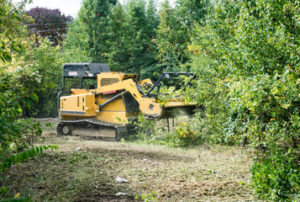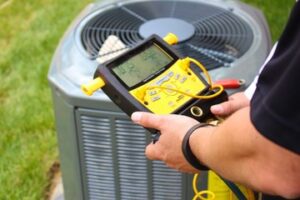Underbrush Removal Buda TX is an important first step in preparing land for construction, agriculture, or other uses. Clearing dense vegetation provides easier access for workers and equipment, which improves safety on-site.

Forestry mulching is the newest and most effective way to remove underbrush and other unwanted vegetation without disturbing soils or desirable plants. This is an eco/cost friendly alternative to traditional “Bush Hogging” methods.
Underbrush removal is the process of removing the little bushes, shrubs, and trees that grow between and underneath larger trees on a property. This process improves the overall aesthetic of a property by removing unsightly tangled vegetation, and it can make a home or land less vulnerable to wildfire by reducing the area where fire can spread.
In addition, underbrush clearing can help prevent pests like snakes, scorpions, rodents, and ticks from hiding on the property. It also promotes the growth of desired plants and trees by removing competition for nutrients. Underbrush clearance is often used to prepare land for construction, farming, or landscaping projects. However, it is important to balance this activity with erosion control techniques in order to preserve the health and sustainability of the soil.
When underbrush is allowed to overgrow, it can block access to a home or other buildings on the property. It can also impede the flow of rainwater, leading to flooding and soil degradation. Invasive species such as salt cedar, pine beetles, and buckthorn can choke out native plant species and alter the natural water table, causing environmental and ecological harm. Underbrush clearing helps to remove these invasive species, and it can also protect wetlands, rivers, and lakes by preventing runoff from contaminated soil.
While it may be possible to clear underbrush by hand using a rake, shears, or brush cutters, this process is much more efficient when conducted with the help of specialized machinery. Our underbrush clearing professionals can use a machine called a forestry mulcher to grind up tangled underbrush and debris, and it then turns them into a nutrient-rich mulch that will help the soil.
In addition, underbrush clearing makes the entire property look neater and more inviting, which can help boost its value if you plan to sell it in the future. A tangled mess of bushes, briars, and vines can turn off potential buyers and make your property look run down and neglected. Regular underbrush clearing will keep the entire property looking attractive and pristine, and it will reduce the amount of time spent mowing the lawn or doing other chores on the property.
Prevents Access to Your Property
Invasive plant species often latch onto and choke out other trees, shrubs, and ground cover. Over time, this can lead to thick clumps of growth and brush entanglements that make it difficult or impossible to use a piece of land. Underbrush clearing services can remove these tangled plants, allowing you to access and enjoy your land more easily. They can also help you conduct the kind of land survey that’s necessary before undertaking a construction project on your property.
Regular underbrush removal can improve the overall health of your property’s vegetation by removing competition for nutrients. It’s important to hire a professional that has experience working with different types of undergrowth and understands how to best clear it without damaging the surrounding plants. For larger areas, specialized machinery like forestry mowers can be used to grind up tangled brush and other debris into mulch that will nourish the soil underneath.
Overgrown bushes, vines, and briars can be unsightly and turn off potential buyers when it comes time to sell your home or land. Regular underbrush clearing can make your lawn and gardens look well-groomed and clean, which can boost your curb appeal and help you sell your property faster.
In regions that are prone to wildfires, underbrush clearance is even more essential. Thick undergrowth can provide a fire with ample fuel and put your homes, structures, and other property at risk of damage or loss. Underbrush clearing services can prevent this by creating a natural firebreak around your buildings that keeps flames from spreading to them.
Overgrown bushes, vines, and other plants can block pedestrian or vehicle traffic on your land. Underbrush clearing services can clear these tangled weeds to ensure that you, your family, and friends can safely navigate your property. They can also improve access to your home or other outdoor spaces, preventing utility workers from having to hack through tangled brush to get to what they need to work on. This can prevent the need for costly repairs in the future. It’s also a great way to make your property more usable, improving the value of your land and home.
Makes Your Property Usable
Overgrown bushes and other types of vegetation can limit the amount of usable space on your property. Underbrush clearing allows you to create pathways that can be used by pedestrians and cars, which can improve the accessibility of your property. It also prevents utility workers from having to cut through tangled brush when they need to work on or repair anything that is located on your land.
A home or piece of land that is covered with overgrown bushes and briars can look extremely unkempt. Regular underbrush removal makes your yard and other parts of your property look neat and organized, which can be beneficial if you plan on selling the property in the future. It can help potential buyers see the true potential of your property and may encourage them to make an offer on it.
Clearing undergrowth can also prevent pest infestations and promote the health of your yard. Thick bushes and other types of vegetation serve as natural breeding grounds for ticks, rodents, snakes, and other insects that can harm you or your pets. Regular underbrush removal helps prevent these pests from invading your property and ensures that your lawn is healthy and free of fungus or other toxins.
Underbrush Clearing can be a very time-consuming process, but it’s an important part of land management. Keeping your land clean and underbrush-free can protect against wildfires, improve the health of trees and other plants, and reduce the risk of pests and other issues that could affect your property in the long term.
Underbrush Clearing is a key part of land management, but it’s important to use proper erosion control techniques during the process to minimize the environmental impact. It’s also important to balance the needs of underbrush clearance with other land management practices, such as cropping and grazing. When these processes are used together, they can create a more sustainable ecosystem that provides the right conditions for native species to thrive. The right underbrush clearing techniques can also promote the growth of desirable plants by allowing sunlight, water, and nutrients to reach them more easily without competing with other vegetation.
Makes Your Home Less Vulnerable to Wildfire
Whether they live in rural wilderness areas or suburban communities, homeowners need to take steps to ensure their property is protected against the threat of wildfires. Keeping lawns watered and mowed, and brush and debris cut down is one of the best ways to prevent fire damage to homes. In fact, some states—including Oregon, California, Texas, and Arizona—encourage or even require residents to keep their properties mowed and free of brush and debris as part of proactive wildfire prevention.
Underbrush Removal is the process of removing shrubs, bushes, and small trees from forests or natural areas. This often takes place on a large scale, but it can be done on smaller tracts of land as well. While traditional land clearing removes all vegetation on an area, underbrush clearance targets thick overgrowth without disturbing large trees and the nutrient-rich topsoil layer underneath it.
The main reason people seek out underbrush removal services is to make their land more usable. It can be nearly impossible to get to a home or other structure when underbrush covers the landscape. The use of heavy equipment—such as a forestry mulching tractor or hydraulic mulching head on an excavator—makes it easier to clear large areas of brush and other vegetation.
Forestry mulching also helps reduce the risk of wildfires by reducing the amount of fuel available for them. This lowers the intensity and speed at which a fire spreads, as well as reduces smoke production and the health risks associated with it.
Moreover, underbrush removal is important for the overall health of forests and other natural areas. It can help reduce the amount of invasive plants that compete with native species for nutrients in the soil. It can also make it easier for larger trees to access the nutrients in the soil, which is vital for their survival and growth.
Underbrush clearance isn’t just important for protecting your home from wildfires, but it can also improve the aesthetic of your property and boost its value. It makes the yard look neater and more appealing, which can encourage home buyers to be willing to pay more for your home. It can also make the yard safer for children and pets to play in, as it will be less of a hazard.

